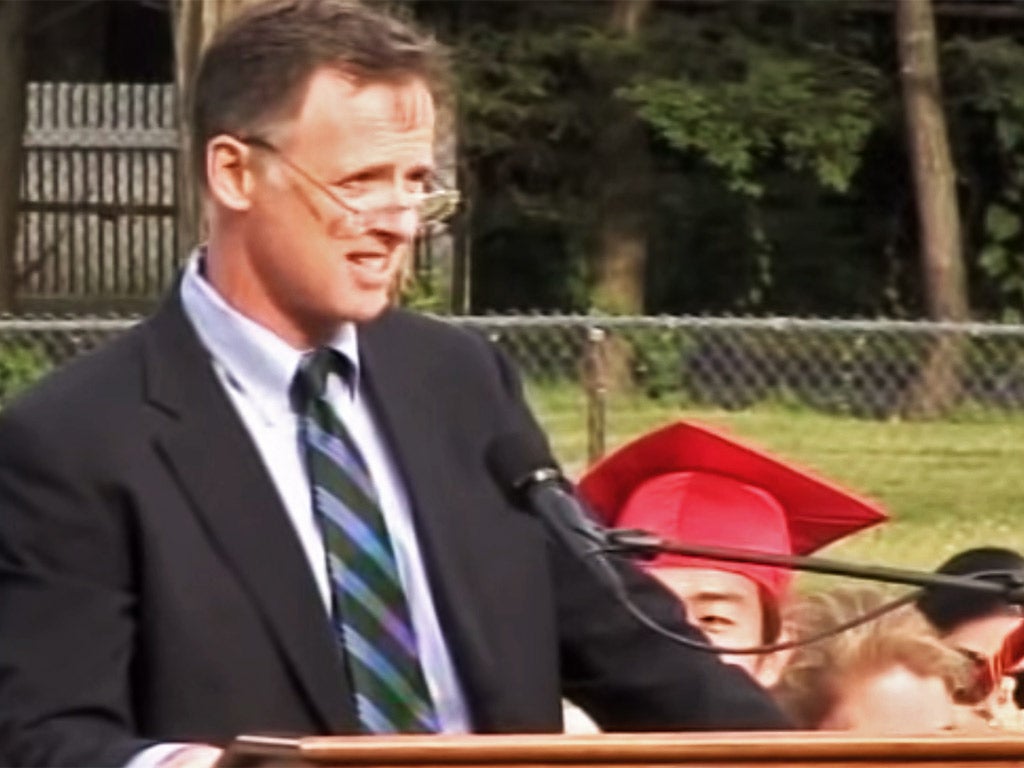Teacher David McCullough JR: "Why I was right to tell students they're nothing special"
David McCullough JR's speech to students, in which he told them that they were insignificant, swiftly went viral. In an extract from his new book, he explains why it's a message that all teenagers starting the new term need to hear

Late in the afternoon of 1 June 2012, I gave a speech to an American graduating class. My audience, or so I thought, was seated before me at the high school in Wellesley, a suburb west of Boston, where I teach English. I did not know that the electronic world was eavesdropping, nor would I have thought that anyone beyond earshot would take an interest in what I might say.
Within a few days, though – thanks initially, it seems, to a line or two taken out of context – my speech and I became international headlines. Suddenly I was the "you're not special" guy. From Berlin to Beijing, Facebook, Twitter and the blogosphere went crazy. The video, which I did not know was being shot, went viral.
My inbox exploded. Local, national and international print reporters, radio people and television people scrambled to interview me. Letters of appreciation began arriving. Limousines appeared in my driveway. It was sudden, surreal and gratifying. All because of a 12-minute speech. And I, a somewhat ruminative sort, perfectly content with a quiet life, scratched my head.
The substance of my remarks came from a growing concern about what I've been seeing over the past several years, in my classroom, around school, across the culture, in my own household. Spurred by well-meaning but all too often micro-managing parents with resources to expend, teenagers in great number are becoming ever more preoccupied with conspicuous achievement – often at the expense of important formative experiences.
Many are suffering from (or, rather, enjoying) inflated notions of themselves and regard every opportunity as theirs for the asking, every accolade as their due. "We're not superior…," (popular notions of equality and fairness prohibit them from thinking that) "…we're just special." Glowing successes, they assume, and therefore much happiness, will naturally follow. In this new cult of exceptionalism, to be average, just regular – for most an unavoidable statistical fact – is to be thought inferior. To be ordinary is to be left behind.
No wonder so many children are having trouble recognising what matters or finding their way. I'm not the first, certainly, to notice what's happening, nor the first to share these concerns, but 26 years in a school classroom, and the teenagers in my own house, have afforded me certain insights.
In many ways adolescents have never had it better. Opportunity, at least for some, would seem nearly limitless in scope and number and wow factor. But, for fear that left to themselves children will mess up their chance at the cultural plums, many parents have reduced to just about nil their children's latitude for independence, for pursuing an impulse to explore, for taking a risk, for enduring struggles, experiencing failure and figuring out what to do about it. We're all over them everywhere they turn – in no small measure because we see in them such quality, such potential. Or hope that we do.
So kids are trained, harnessed and directed to perform, to have answers and have them first, to earn As, score goals, play Bach, to prove themselves always and forever special. In everything that they do, then, the stakes seem to them frightfully high. Any sign of a wobble and their parents step in. From birth they're strapped into the car seat and in a sense they never get out – they're protected, driven and aimed in one direction.
They're expected to thrive. To soar. For many, expectation starts to feel like mandate, even inevitability. Should they not soar, though, we seek to change the rules, or lower expectations, blind ourselves to perspective and call them accomplished just the same. And why? Today's teenagers are, too many of them, unwitting victims of their parents' good intentions – or passive agents of their parents' vanity, or pawns to their parents' insecurities, or anxieties, or limited imaginations.

They've become showpieces in an arms race to impress university admissions officers and perpetuate the legacy of privilege. The competition is, after all, stiff out there. Too often, though, their privileges are unwisely expended, in my view, and serve to promote, however inadvertently, swelling narcissism, assumptions of entitlement, superficial and/or robotic thinking. Empathy withers. Maturation is slowed or halted altogether. Self-reliance dies in the bud. And the anxious parent feels compelled to intercede once again.
And they're tired, teenagers are, all the time. They get half the sleep they need, an eighth of what they'd prefer. They're oversubscribed at school and overscheduled after. Even under the best of circumstances their eagerness to do homework registers down there with dental surgery, yet to them it feels like that's all they do. Late into the night they trudge through 50 French vocab words, five questions to answer on a history chapter, a lab report for chemistry, a 10-problem exercise for maths, a five-page analysis of Iago's motivations . . .
But the loud demand of our schools these days is to produce high achievers in big numbers. Abetted by a laudable spirit of inclusion, concern for strugglers and impulses to innovate, this is most efficiently accomplished across the spectrum with lower standards, gentler assessments and inflated grades. Should a concerned or sceptical eyebrow go up, explain it away with earnestness, hip packaging and edu-jargon. Should intellectual rigour suffer, redefine the term.
Because each school year builds on the one before it, the long-term effect is underprepared pupils persuaded that they're doing perfectly well and have been, probably, for as long as they can remember. And since they don't know what they don't know, and not knowing has yet to prove much of an issue, they wonder what all the fuss might be.
And it's not just how we're assessing them. Much energy among departments is devoted these days to concerns about "engaging young learners" in "student-centred experiences", to providing opportunities in "collaborative learning," in which students develop a "skill set" and have "a personal investment" and are "empowered" to "think outside the box" and become part of a "community of lifelong learners". Yet we grade them, too. Grades don't matter, we preach ad infinitum, but what the hell is this C+?
Further, schools have assumed, or have had foisted upon them, aspects of raising children formerly addressed at home. And for fear of appearing exclusionary or bruising a child's self-esteem, teachers will minimise risk by reducing rigour, keeping goals within easy reach and throwing ever more confetti when he or she gets there.
Of course, if one stops for a second to consider the brutalities that torment good and honest people around the world, the fact that privileged teenagers are being micro-managed and indulged to their detriment seems an issue trivial in the extreme. If this is our big worry, then, well, we're very lucky to have it.
So let 'em eat quiche, one might be inclined to conclude. Who cares? We have, don't we, a few more pressing concerns? Well, I'll suggest that these indulged young people could be, should be, part of the solution for a planet in sore need. With their advantages they could be, should be, leading the way. In each child is enormous promise, talent, imagination, energy, heart.
We should be raising them, preparing them, with that in mind, setting our goals a little beyond end of term reports and, fingers crossed, a golden acceptance letter. We should see the comfort and security we enjoy and the resources at our disposal as opportunities, as responsibilities, to do the planet and those who inhabit it some good, to right what wrongs we can, to shoulder our share of the load and then some.
Of what purpose civilisation if those welcome to the best it can offer wrap themselves in selfishness and delusion? That some of us have gone a bit awry in raising our children, then, is in my view a danger. At risk is more than just the likelihood of productive, fulfilling lives. Alarmist though this may sound, send enough under-realised, overmatched kids into civilisation, or what these days is passing for it, and it will collapse upon itself, too hollow for its weight.
This is an edited extract from 'You Are Not Special: and Other Encouragements' by David McCullough Jr, out today (Scribe, £12.99)
Join our commenting forum
Join thought-provoking conversations, follow other Independent readers and see their replies
Comments